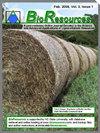不同温度和湿度条件下欧洲赤松的自由干燥收缩性能
IF 1.3
4区 农林科学
Q2 MATERIALS SCIENCE, PAPER & WOOD
引用次数: 0
摘要
木材的高效利用离不开高质量的干燥,而分析木材的自由收缩性能对于优化干燥过程至关重要。本研究以欧洲赤松锯材(500 mm×200 mm×50 mm)为研究对象,采用图像分析方法分析了不同温度和试材轴向位置对试样厚度方向各层自由干缩系数的影响规律。试验材料厚度方向各层的自由干缩系数从靠近切线方向的第一层的最大值(0.282%、0.275%、0.267%,温度分别为 60 °C、80 °C、100 °C)下降到靠近径向方向的第九层的最小值(0.248%、0.249%、0.227%);除近径向层外,当温度从 60 °C 升至 100 °C 时,其他代表层的自由收缩系数随温度升高而降低。第一层的自由收缩系数从 0.282% 降至 0.267%,第五层从 0.264% 降至 0.243%。试验材料不同轴向位置对应层之间的自由收缩系数差小于 0.017%,轴向位置对应层的尺寸稳定性较高。本文章由计算机程序翻译,如有差异,请以英文原文为准。
Free drying shrinkage performance of Pinus sylvestris L. under different temperature and humidity conditions
Efficient utilization of wood is inseparable from high-quality drying, and analysis of its free shrinkage performance is essential to optimize the drying process. This study took Pinus sylvestris L. sawn timber (500 mm×200 mm×50 mm) as the research object and adopted the image analysis method to analyze the influence rules of different temperatures and axial positions of the test material on the free dry shrinkage coefficient of each layer of specimens in the thickness direction. The free shrinkage coefficients of each layer in the thickness direction of the test material decreased from the maximum value of the first layer near the tangential direction (0.282%, 0.275%, 0.267%, at 60 °C, 80 °C, and 100 °C, respectively) to the minimum value of the ninth layer near the radial direction (0.248%, 0.249%, 0.227%); except for the near-radial layers, when temperature increased from 60 °C to 100 °C the free shrinkage coefficients of other representative layers decreased with increased temperature. The first layer’s free shrinkage coefficient decreased from 0.282% to 0.267%, and the fifth layer decreased from 0.264% to 0.243%. The difference of free shrinkage coefficients between corresponding layers at different axial positions of the test material was less than 0.017%, and the size stability of the corresponding layers at axial positions was high.
求助全文
通过发布文献求助,成功后即可免费获取论文全文。
去求助
来源期刊

Bioresources
工程技术-材料科学:纸与木材
CiteScore
2.90
自引率
13.30%
发文量
397
审稿时长
2.3 months
期刊介绍:
The purpose of BioResources is to promote scientific discourse and to foster scientific developments related to sustainable manufacture involving lignocellulosic or woody biomass resources, including wood and agricultural residues. BioResources will focus on advances in science and technology. Emphasis will be placed on bioproducts, bioenergy, papermaking technology, wood products, new manufacturing materials, composite structures, and chemicals derived from lignocellulosic biomass.
 求助内容:
求助内容: 应助结果提醒方式:
应助结果提醒方式:


